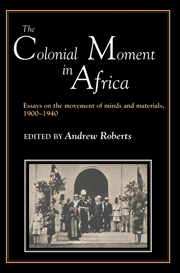Preface
Published online by Cambridge University Press: 09 January 2010
Summary
From the vantage-point of the late twentieth century, its first forty years constitute a ‘colonial moment’. By 1900, most of Africa had been partitioned among seven European powers, and over the next few decades colonial regimes tightened their grip. By 1936, when Italian forces entered Addis Ababa, white rule prevailed throughout the continent except in Egypt and Liberia. At the outbreak of World War II, few doubted that, in Africa at least, colonial rule would endure for a long time yet. To be sure, there was mounting unrest in the 1930s, among African wage-earners as well as farmers, but this scarcely seemed to threaten white monopolies of power. For the foreseeable future, the white man expected to continue to bear his burden of responsibility for a continent in tutelage.
To some, then, this period may seem to be a mere interlude, in which Africa largely receded from the mainstream of history: a pause between the power-struggles of the ‘Scramble’ and the break-down of empires after 1945. But this is to take a Eurocentric view, and one, moreover, which ignores much of what matters most about the past. Colonial rule may have appeared to be firmly entrenched, but it facilitated economic and cultural changes which enlarged the horizons of Africans far more rapidly than their rulers cared to acknowledge. The years between 1900 and 1940 witnessed, on an unprecedented scale, transformations in social identities, cognitive systems and means of communication. These are of profound importance for the history of African thought and action in the twentieth century; they happen also to be crucial for any attempt to explain the timing and course of decolonisation.
- Type
- Chapter
- Information
- The Colonial Moment in AfricaEssays on the Movement of Minds and Materials, 1900-1940, pp. 1 - 2Publisher: Cambridge University PressPrint publication year: 1990



